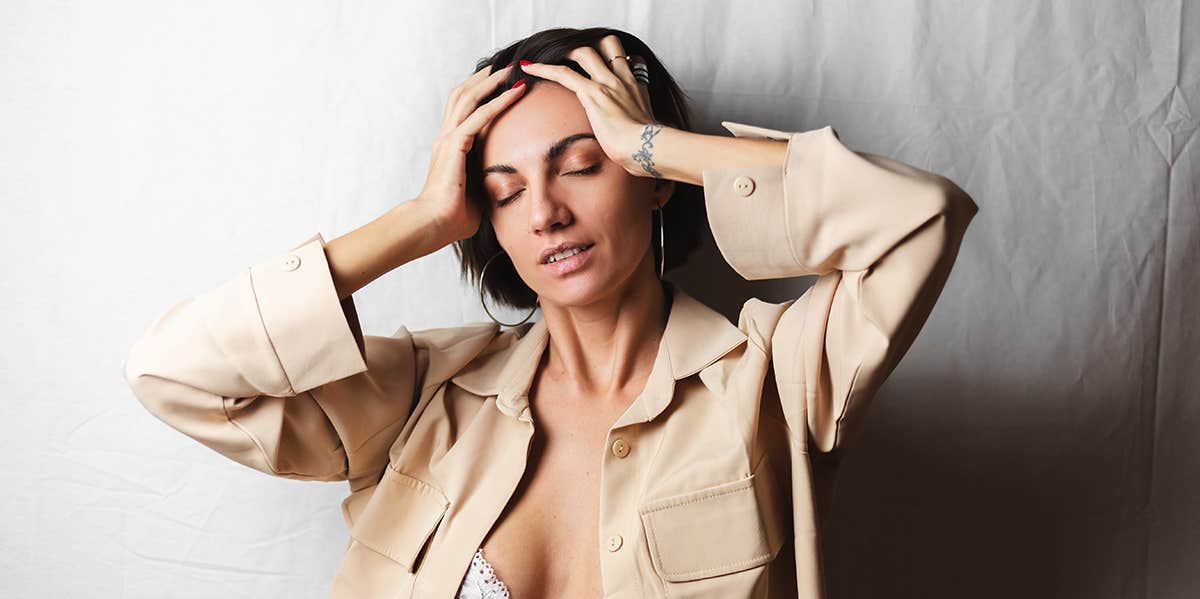What 'SMH' Means And How To Use It Properly
It's not a new term, FYI.
 KK_face / Shutterstock
KK_face / Shutterstock We live in an age of acronyms, and for good reason: most of our communication is text-based. As such, we look for the quickest and most concise way to communicate information and convey thoughts and feelings with just a few characters.
But if you aren't a teenager or aren't living with one, you may struggle to keep up with the ever-evolving lingo. The good news is that you aren't alone.
Let's break down one of the most common acronyms, SMH.
What does SMH mean?
SMH stands for “shaking my head.”
SMH is used to express general disapproval, exasperation, and frustration. It's also used anytime someone says or does something you don't approve of.
According to Urban Dictionary, it's “used when someone finds[/does] something so stupid no words can do it justice."
You can find a more "official" definition of SMH through Merriam-Webster, who defines SMH as an acronym for shaking my head "used to impart a sense of bemused incredulity." While Merriam-Webster has yet to actually add SMH to the dictionary, it notes that the acronym is one of the dictionary's "words to watch."
Since the letters and even meaning behind SMH are fairly ambiguous, debates have sprung up about what exactly the term means. One of the most common misconceptions is that SMH stands for "smack my head," a definition that many Reddit threads have debunked.
While the SMH meaning is the base form of “shaking my head,” sometimes individuals choose to use a more expressive acronym. Common variations include SMDH or SMFH, which mean, respectively, “shaking my damn head” and “shaking my f***ing head.”
RME, which stands for "rolling my eyes," and "facepalm" are often used interchangeably with SMH. The latter is often accentuated between asterisks to indicate that the person using the word is actively putting their palm to their face in exasperation.
SMH can also be used to mean “stupid minded humans” or “so much hate.”
Origins of the Term SMH
Unlike other common acronyms, the origins of SMH are unclear; however, entries on Urban Dictionary dating back to 2004. User trickologist defined the acronym as "shake my head," eventually spreading in use and popularity.
In 2007, user metaview added the definition for SMDH, "shaking my damn head," to Urban Dictionary, and by 2010, the acronym SMH had reached the mainstream.
These days, the acronym is a staple on social media sites like Reddit and Twitter, in the comment sections of Instagram and TikTok, and through text messaging.
How to Use SMH Correctly
While SMH is usually capitalized, it's also often used in lowercase, as smh. But regardless of which variation you use, there are many ways to use SMH, including these examples:
1. Embarrassment
"My mom is singing Drake. SMH."
"I can believe he said that in front of everyone! SMH."
"Did you see what Becky was wearing? SMDH."
2. Disappointment
"Can you believe John fell asleep during 'Avengers: Endgame'? SMH."
"Kids these days don’t know what good music is. Seriously SMH.
3. Exasperation
"This week has been too damn much. SMH."
"Lost my phone last night and now I’m just SMH."
Why do people say SMH?
With acronyms becoming part of our daily lives, especially in text messages and on social media platforms, using SMH is a great way to save time, rather than explaining the emotions you feel in reaction to something.
People use SMH as a way to express embarrassment, disappointment, frustration, or any other negative emotions in response to the actions of another person. But SMH can also be used in a humorous way, particularly among friends in a text exchange.
The bottom line is that people use SMH for a variety of reasons, but most commonly to express their annoyance or discomfort.
Nicole Lane is a wife, mother, writer, and regular contributor for YourTango. She is a staunch defender of women's rights, she believes firmly in equality and parity, and she is an advocate for women's health, mental health, and sexuality.

